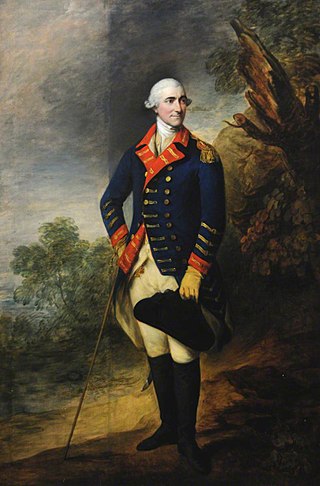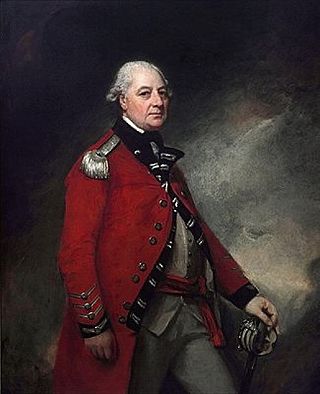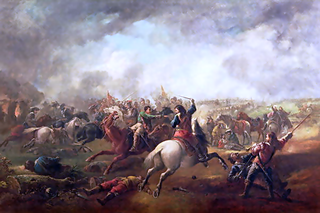Related Research Articles

Field Marshal Henry Seymour Conway was a British general and statesman. A brother of the 1st Marquess of Hertford, and cousin of Horace Walpole, he began his military career in the War of the Austrian Succession. He held various political offices including Chief Secretary for Ireland, Secretary of State for the Southern Department, Leader of the House of Commons and Secretary of State for the Northern Department. He eventually rose to the position of Commander-in-Chief of the Forces.

Joseph Kevin McNamara was a British Labour politician who served as a Member of Parliament (MP) for almost 40 years.
Baron Kensington is a title that has been created three times, in the Peerages of England, Ireland and the United Kingdom.

Events from the year 1812 in Canada.

Field Marshal George Townshend, 1st Marquess Townshend, PC, known as The Viscount Townshend from 1764 to 1787, was a British soldier and politician. After serving at the Battle of Dettingen during the War of the Austrian Succession and the Battle of Culloden during the Jacobite Rising, Townshend took command of the British forces for the closing stages of the Battle of the Plains of Abraham during the Seven Years' War. He went on to be Lord Lieutenant of Ireland or Viceroy where he introduced measures aimed at increasing the size of Irish regiments, reducing corruption in Ireland and improving the Irish economy. In cooperation with Prime Minister North in London, he solidified governmental control over Ireland. He also served as Master-General of the Ordnance, first in the North Ministry and then in the Fox–North Coalition.

The First English Civil War took place in England and Wales from 1642 to 1646. It is part of the 1639 to 1653 Wars of the Three Kingdoms, which also include the Bishops' Wars, the Irish Confederate Wars, the Second English Civil War, the Anglo-Scottish war (1650–1652) and the Cromwellian conquest of Ireland. Historians calculate some 15% to 20% of all adult males in England and Wales served in the military between 1639 to 1653, while around 4% of the total population died from war-related causes, versus 2.23% for World War I. These figures illustrate the impact of the conflict on society in general, and the bitterness it engendered.

Wilberforce House is a British historic house museum, part of the Museums Quarter of Kingston-upon-Hull. It is the birthplace of social reformer William Wilberforce (1759–1833), who used his time as a member of Parliament to work for the abolition of slavery throughout the British Empire. Like the nearby Blaydes House and Maister House, also on the High Street, the Grade I listed building was formerly a merchant's house with access to quayside on the River Hull.
This is a list of people who served as Lord Lieutenant of County Meath, Ireland.
Wright was a federal electoral district in Quebec, Canada, that was represented in the House of Commons of Canada from 1896 to 1948.

The first Siege of Hull marked a major escalation in the conflict between King Charles I and Parliament during the build-up to the First English Civil War. Charles sought to secure the large arsenal held in Kingston upon Hull, East Riding of Yorkshire. He first approached the town in late April 1642 and was rebuffed by the town's Parliamentarian governor, Sir John Hotham. Charles retreated to York but in July he received news that Hotham might be willing to hand over the town if the Royalists approached with force large enough for Hotham to surrender with his honour intact.
Midleton was a constituency represented in the Irish House of Commons until 1800. Incorporated by Charter, 1671 whereby it was granted to Sir John Brodrick with a Corporation sovereign, two bailiffs and 12 burgesses. It was disenfranchised at the Act of Union and compensation of £15,000 paid to Viscount Midleton.
Richard Pockrich, Poekrich, or Puckeridge, was an Irish musician, and was the inventor of the glass harp in 1741.
Samuel Kent was an MP for Ipswich in the 8th, 9th, and 10th Parliament of Great Britain, sitting from 23 January 1735 to his death in 1759.
Robert Maxwell, 1st Earl of Farnham PC, styled The Honourable Robert Maxwell from 1756 to 1759, was an Irish peer and a Member of both the Parliament of Great Britain and the Parliament of Ireland.
William Hull was a loyalist activist in Northern Ireland. Hull was a leading figure in political, paramilitary and trade union circles during the early years of the Troubles. He is most remembered for being the leader of the Loyalist Association of Workers, a loyalist trade union-styled movement that briefly enjoyed a mass membership before fading.
Events from the year 1759 in Ireland.
General Philip Honywood was a British army officer who sat in the House of Commons from 1754 to 1784.
Thomas Burgh was an Irish politician who was MP for Naas (1731–1759).
References
- ↑ Johnston-Liik, E. M. (2006). MPs in Dublin: Companion to History of the Irish Parliament, 1692-1800. Ulster Historical Foundation. p. 97. ISBN 1903688604.